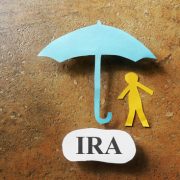Self-Directed IRA Owners, Don’t Make This One Retirement Mistake!
It doesn’t much matter whether you’re a hard-core Self Directed IRA aficionado, or you’re just doing your best with your Fidelity, Vanguard or Schwab account in a conventional IRA or other retirement plan, the temptation to pull money out early is powerful.
But for the vast majority of Self Directed IRA investors, it’s a bad move. The tax penalties and opportunity costs arising from foregone preferential tax treatment in future years is severe. According to a recent survey of experienced investors from E-Trade, prematurely pulling money out of retirement accounts prior to retirement age is among the biggest mistakes people make in their retirement planning.
According to the E-Trade survey, younger investors were particularly prone to this mistake: 34 percent of millennials responding reported that they had made retirement withdrawals. Women were somewhat more likely to make early withdrawals than men – 27 percent to 22 percent.
Women are also leading the league in regret: 59 percent of the women who reported taking an early withdrawal report that they regretted it, compared to 53 percent of the men.
This indicates that whatever these people are doing with the money they are taking out of their retirement accounts, it’s not working out too well for them.
Tax Penalties for Early Withdrawals From Self Directed IRAs and Other Retirement Accounts
Withdrawals from retirement accounts can cost you big time: Except for specific hardship provisions defined by law, any withdrawals from a traditional IRA, SEP IRA, SIMPLE IRA or 401(k) plan prior to age 59½ will generate a 10 percent excise tax penalty right off the top. With SIMPLE IRAs, that penalty could amount to as much as 25 percent if you make the withdrawal within the first three years. However, if you’ve separated from service from your employer, and you’re over age 55 that penalty will not apply.
The penalty, of course, will be stacked on top of income tax at your highest marginal rate. Assets you pull out of IRAs and other retirement accounts don’t qualify for lower long-term capital gains rates. You will have to pay full-boat ordinary income tax on those amounts. You’ll also be responsible for state income taxes as well, if your state taxes retirement account income. Here in North Carolina, that could mean an additional 5.8 percent, on top of every thing else.
The Hidden Cost of Tapping Your Self Directed IRA Too Soon
But the real damage comes with opportunity cost. Here’s why:
Let’s say you are 40 years old and you decide you want to pull $10,000 out of your retirement account to spend on some priority or other. Even if you qualify for a hardship withdrawal, you give up whatever that $10,000 would have generated if left to compound until retirement age.
If you assume an average annual return of 7 percent – fairly conservative by most standards today, and many of our clients are generating much more than that each year – that amount would grow to some $76,000 by the time you reach age 70.
Furthermore, when it comes to IRAs, it’s very difficult to undo the damage you do to your retirement savings potential when you make a withdrawal. Even if you have a great year next year and you want to invest quite a bit, your contributions are limited. For IRAs, including Roth IRAs (which compound tax free), you are limited to an annual contribution of $5,500 for any given calendar year. Once you turn age 50 you can contribute an additional $1,000. Your ability to deduct your contribution to traditional IRAs is limited by your income, as is your ability to contribute to a Roth IRA.
So even if you have lots of money in the following year, you can never get that year back – and you cannot make up the compounding you lost in the meantime, except in the most theoretical sense by taking on much more risk.
Self Directed IRA Investors Should Take the Long View
Long term, the best approach is almost always to refrain from tapping retirement accounts until the 10 percent penalty provision no longer applies. If you need to retire early, try to take advantage of the IRS’s early retirement exemption to the penalty under Section 72(t) of the Internal Revenue Code, which allows for the annuitization of your IRA penalty free provided you do so using a series of substantially equal periodic payments over your life expectancy or the joint life expectancy of you and your spouse.
American IRA, LLC is among the country’s leading providers of third party administration services to owners of self-directed retirement accounts. Join us online at www.americanira.com, or call us for a free consultation at 828-257-4949.
We look forward to hearing from you.







